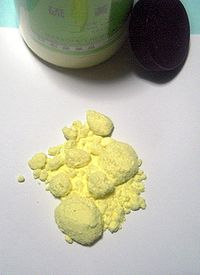Reagent

A reagent /riˈeɪdʒənt/ is a substance or compound added to a system to cause a chemical reaction, or added to see if a reaction occurs.[1] The terms reactant and reagent are often used interchangeably—however, a reactant is more specifically a substance consumed in the course of a chemical reaction.[1] Solvents, though involved in the reaction, are usually not called reactants. Similarly, catalysts are not consumed by the reaction, so they are not reactants. In biochemistry, especially in connection with enzyme-catalyzed reactions, the reactants are commonly called substrates.
In synthetic organic chemistry, reagents are compounds or mixtures—usually composed of inorganic or small organic molecules—that cause a desired transformation of an organic compound. Examples include the Collins reagent, Fenton's reagent, and Grignard reagents. In analytical chemistry, a reagent is a compound or mixture used to confirm the presence or absence of another substance, e.g. by a color change. Examples include Fehling's reagent, Millon's reagent, and Tollens' reagent.
When purchasing or preparing chemicals, reagent-grade describes chemical substances of sufficient purity for use in chemical analysis, chemical reactions or physical testing. Purity standards for reagents are set by organizations such as ASTM International or the American Chemical Society. For instance, reagent-quality water must have very low levels of impurities such as sodium and chloride ions, silica, and bacteria, as well as a very high electrical resistivity.
In the field of biology, the biotechnology revolution in the 1980s grew from the development of reagents that could be used to identify and manipulate the chemical matter in and on cells.[2][3] These reagents included antibodies (polyclonal and monoclonal), oligomers, all sorts of model organisms and immortalised cell lines, reagents and methods for molecular cloning and DNA replication, and many others.[3][4]
See also
- Chemical reaction
- Limiting reagent
- Common reagents
- Solvents
- Catalysts
- Category:Reagents for organic chemistry
- All pages with titles beginning with Reagent
- All pages with titles containing Reagent
References
- ^ a b IUPAC, Compendium of Chemical Terminology, 2nd ed. (the "Gold Book") (1997). Online corrected version: (1996) "Reactant". doi:10.1351/goldbook.R05163
- ^ Fox, Jeffrey L. (1 January 1979). "Antibody reagents revolutionizing immunology". Chemical & Engineering News Archive. pp. 15–17. doi:10.1021/cen-v057n001.p015.
- ^ a b "Report of the National Institutes of Health (NIH) Working Group on Research Tools". NIH. June 4, 1998. Archived from the original on August 16, 2000.
- ^ Ishino, S; Ishino, Y (29 August 2014). "DNA polymerases as useful reagents for biotechnology - the history of developmental research in the field". Frontiers in microbiology. 5: 465. PMC 4148896. PMID 25221550.
